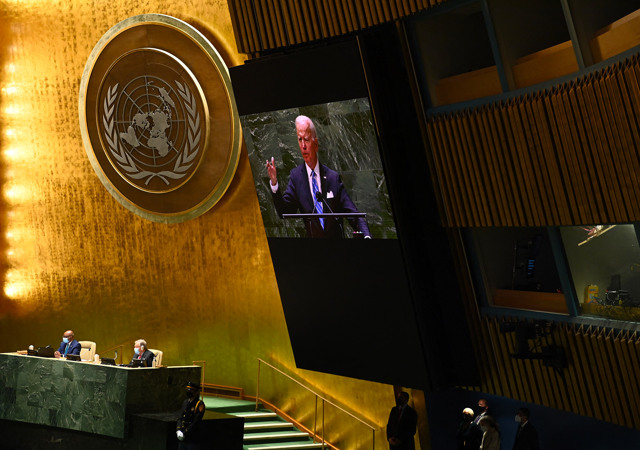September 22, 2021 10:02 am
If the president of the United States had delivered his September 21 speech at the beginning of his term, he would have been applauded unreservedly in Europe. Instead, the intervention before the United Nations General Assembly came five weeks after the fall of Kabul (with the related doubts about the role and method of the United States) and a few days after the Australian submarine affair, which suggests a lack of loyalty to an ally.
Biden was expected and behaved “like Biden”, with a positive and offensive speech. The president has uttered the formula “with our allies and partners” more than a dozen times, reaffirming the multinational commitments of the United States for the climate, for the fight against covid-19 and for the defense of democracy.
In several respects this speech may seem the antithesis of those of his predecessor Donald Trump, whose speeches at the UN have often been a cold shower. But after Kabul the problem is no longer Trump. It’s Biden himself.
Evidently, it will take more than one speech to reassure all those who have been observing the behavior of the United States with concern in recent weeks. The brutal abandonment of Afghanistan clashes with the lyricism on democracy: the Afghans and especially the Afghans, once again under the yoke of the Taliban, are clearly excluded.
Biden’s speech was a mixture of democratic messianism and the will to power
Similarly, the insistence on “allies and partners” contrasts with what France experienced with the Australian submarine affair: three countries negotiated keeping one of the closest allies in the dark, to exclude him from an important contract and from a great diplomatic initiative. The feeling of “betrayal” denounced by Paris is clearly shared (after a heavy silence) by the highest European officials. Washington will have to take this into account.
Disappointed allies
The speech also outlined what we might call the “Biden doctrine” for the world, a mix of democratic and anti-authoritarian messianism and global will-to-power on the part of an invigorated America that doesn’t necessarily want to resort to military force.
China was not named directly, but it is at the center of the US president’s speech. Biden said he did not want to unleash a new “cold war” or create a “blockade” policy. The fact remains that the current situation also tends towards conflict.
On the one hand we have the alliances created by the United States to contain Chinese power: the Aukus (Australia, United Kingdom, United States) announced between 15 and 16 September and the Quad (Quadrilateral Security Dialogue) with India, Japan and Australia, which will meet in Washington on 24 September. On the other hand we find civil initiatives: a vast infrastructure program proposed to the rest of the world in the wake of the Chinese “silk roads” and above all a challenge of democracy to authoritarianism.
The “Biden doctrine” constitutes a program to strengthen the democratic field and allow it to stem a China thirsting for conquest. However, doubts remain about Washington’s ability to carry out this program and restore the confidence of disappointed allies.
(Translation by Andrea Sparacino)
.
